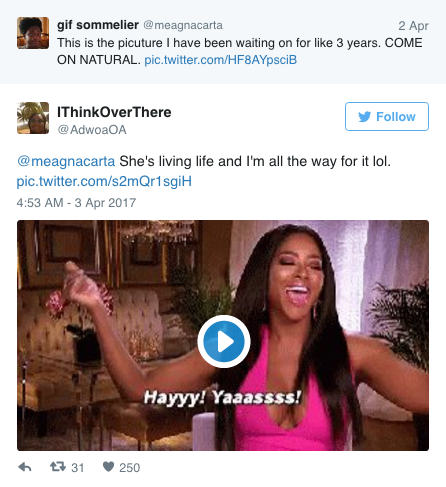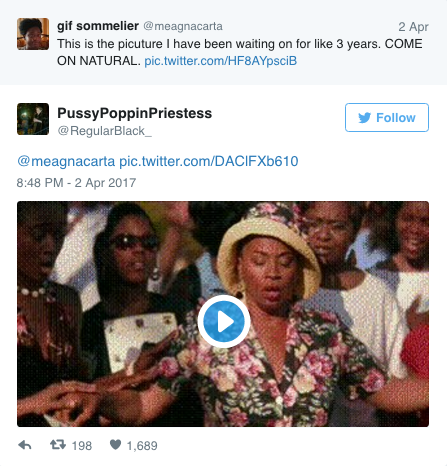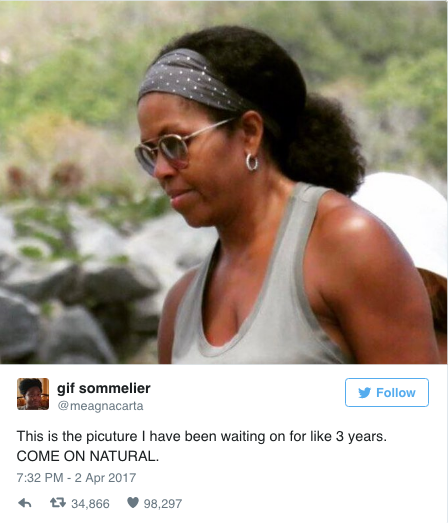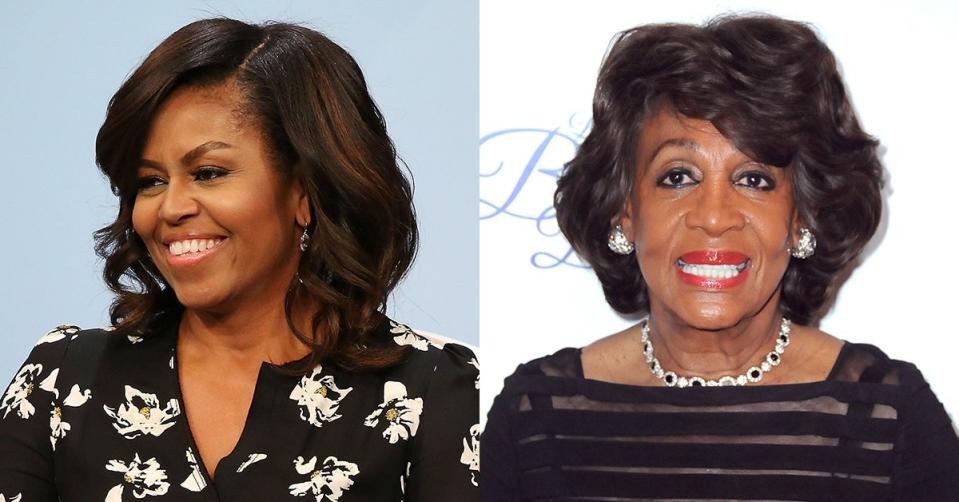I Thought We Were Done Policing Black Hair?
By Jenae Holloway. Photos: Getty Images, Courtesy of Twitter.
Poised, charismatic, brilliant, and stunning are just a few ways to describe my personal muse, Michelle Obama. During her eight years as First Lady of the United States, she made major contributions to the political and cultural landscape with her impeccable style and beauty. She raised the bar on State Dinner fashion, made it OK to "release the shoulders," and even breathed some life into the kitten heel—all while wearing flawlessly “flat-ironed” hair from the moment she hit the national stage in 2008 to Inauguration Day in 2017.
The former FLOTUS knows how to give a look. And in a new photo that's surfaced of her, she's serving “I'm so relaxed and chill but like my girl Solange said: please don’t touch my hair” vibes. She unveiled her bountiful natural curls and made the Internet have a moment.
Now when I saw this picture, TBH, it was no surprise to me. I’ve had the immense pleasure of doing SoulCycle with the First Lady (yes, it’s okay to be jealous), so I’ve seen her in this natural state. In that hot, low-lit room with Beyoncé blasting in the background, we were just two black women with hair wraps and low ponytails ready to leave it all on the bike. But this feeling of solidarity was quickly dashed the next day, as I wrangled my curly hair into a semi-presentable bun only to see FLOTUS gliding through the East Wing with perfectly bouncy, feathered hair as if our SoulCycle rendezvous was all a dream.
And as confounding as this transformation was, it wasn’t all that unpredictable. I assumed that Obama would never just throw her hair in a curly bun like me because 1) she was the First Lady of the United States and has her life together and 2) while being the first black first lady comes with a lot of freedoms, wearing your natural hair is, arguably, not one of them.
Misguided stereotypes about black hair—that it's unmanageable, unclean, unprofessional—mean that many black women still abide by an unwritten rule: straight or pulled-back hair is the only appropriate option for professional environments. A long history of attacks about black natural hair has led to a stigma so pervasive that it’s not only perpetuated by white people—but it's also penetrated generations of black women. My own grandmother used to ask if I’m “wearing my hair like that” when I went to a nice event with naturally curly hair. She associated my straight hair with "looking my best" and proving that I was able to assimilate and socialize with all people, despite my race; but to me, the comment underscored how these insults have translated into deeply entrenched insecurities that have affected black women from the lowest socio-economic backgrounds to high political office.
Proof: Just last week during a Fox & Friends segment, Fox News host Bill O’Reilly was asked to respond to a clip from a speech Congresswoman Maxine Waters made against President Trump on the House floor. Instead of focusing on the powerful statement of a seasoned elected official, O’Reilly chose to target her hair. In a controversial statement that some have called racially charged he said, “I didn’t hear a word she said, I was looking at the James Brown wig.” This remark is just one example of the double jeopardy of black womanhood: being judged unfairly by your race and your gender.
But this was nothing new for Waters, who responded on MSNBC’s All In With Chris Hayes by saying, “Let me just say this: I am a strong black woman and I cannot be intimidated. I cannot be undermined. I cannot be thought to be afraid of Bill O’Reilly or anybody. And I’d like to say to women out there everywhere: Don’t allow these right-wing talking heads, these dishonorable people, to intimidate you or scare you. Be who you are. Do what you do.”
Um, can I please be adopted?
I think it’s clear, no matter what side of the aisle you’re on, it’s unfair and honestly just unbecoming for political commentators (or anyone) to pass judgment on any woman’s looks, especially women who are still battling racist tropes that suggest that our hair is inferior, unattractive, and unacceptable. It’s time to stop policing black hair. And black women are fighting back with the #blackwomenatwork hashtag, which has illuminated many of the insults and microaggressions black women face in the workplace every day.
As the natural hair movement continues to grow, more women are refusing to chemically alter their hair and are revealing their natural curls. With each step like this, including Michelle Obama and the millions of other women who have already "released the curls," we’ll continue to change attitudes about natural hair—creating professional workspaces that don’t just tolerate, but celebrate natural hair.
This story originally appeared on Glamour.
More from Glamour:
What's That Salad the Kardashians Are Always Eating on Their Show?
A Look at the Emmy It Girls of the Past 20 Years: Taraji P. Henson, Tina Fey, and More
The Ultimate 10-Minute Workout
25 Celebrity Haircuts That’ll Make You Want Bangs, Stat
31 Ways to Wear a Ponytail, for Every Hair Length and Texture
34 Times Kate Middleton and Prince William Gave Us Major Relationship Goals





